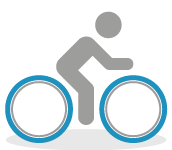Preparation
We have 2 large Cook Freeze Production Units (CFPU’s) where we prepare, cook and freeze the majority of your meals. Our own NHS catering staff work in these CFPU’s. The units are based at Inverclyde Royal Hospital in Greenock and the Royal Alexandra Hospital in Paisley.
Our chefs use fresh ingredients when preparing and cooking your meals.
Once cooked, the meals are blast frozen using specialised freezing equipment. This ensures they are frozen without destroying the nutritional content.
The frozen meals are then heated and plated in small kitchens beside the wards so you get a hot, well presented and tasty meal.
Nutrition
We cater for a wide range of ages. This includes children to the very oldest of our population, and for people who require special diets.
It is important that we meet the nutritional needs of everyone in our hospitals and all our meals are nutritionally analysed by a dietitian.
The NHS Scotland Food in Hospitals National Catering and Nutrition Specification sets out in detail what we need to provide for our patients. The specification gives guidance on how many calories, how much protein, fat and carbohydrate and the essential vitamins and minerals required. NHSGGC complies with this specification.
Our chef’s follow tried and tested recipes. This ensures our dishes are prepared and produced exactly the same way each and every time.
Traceability
We purchase our food and drinks as part of the NHS Scotland National Procurement Framework of approved catering suppliers. Each supplier must meet strict standards including nutritional guidelines and food safety. Every item purchased is fully traceable and protects our patients, staff and visitors.
Where possible we ask for local food producers and suppliers to be approved by National Procurement. Our fresh fish supplier is a Glasgow based company.
Tasting Roadshows
We test our recipes at tasting roadshows held around our hospitals sites. This gives members of the public, patients and staff a chance to try out our food. We have had excellent feedback from our roadshows.
Thanks for your feedback!
Person Centred Virtual Visiting (video calls) helps people to maintain contact with their relatives/friends, when in-person visits are not possible. People can see and talk to those who matter to them using NHS Near Me / Attend Anywhere. You can access this on mobile phones, laptops or computers. All wards have iPads available if you do not have, or are unable to use, your own device.
Person Centred Virtual Visiting was rolled out during the COVID-19 pandemic, and helped people maintain contact when in-person visiting was restricted. It has had a positive impact and continues to play a role to help people remain connected. For more information, please read our PCVV Report.
Supporting Communication Needs
NHSGGC is committed to supporting those who are deaf, hard-of-hearing or who do not speak English. NHSGGC supports communication needs through:
- British Sign Language (BSL) Online Interpreting Service – available 24 hours a day, 7 days a week. Please visit the BSL Online web page for more information.
- Dictation App – The Dictation App installed on hospital iPads, can be used to transcribe speech into readable text. This is helpful when lip-reading is not possible due to the use of face masks.
Frequently Asked Questions
How do I arrange a ‘virtual visit’ (video call) using the NHSGGC iPads?
If you are a patient, please speak to ward staff to arrange a virtual visit using the NHSGGC iPads.
If you are a family member/friend, please contact the ward to arrange a virtual visit. Ward and Department telephone numbers can be found on the NHSGGC website. You will need to provide the ward staff with following details:
- Your family member/friend’s full name
- Your phone number or email address
You will need to ensure your device has a webcam and microphone. Most devices already have this built in.
For further information and guidance on how to arrange virtual visits, please read the Near Me guide.
What happens if my family member/friend does not have a mobile phone or tablet, or needs help to make a ‘virtual visit’?
All of our inpatient wards have a least one iPad for those who wish to make ‘virtual visits’ (video calls) with their relatives and friends during their stay in hospital. If your family member/friend does not have a mobile phone or tablet of their own, or they are unfamiliar/unable to use these devices to set up calls independently, they are welcome to use a hospital iPad. Ward staff will always try to facilitate these calls where possible.
Can I request a ‘virtual visit’ (video call) for a specific time of day?
Where possible, ward staff will try to arrange virtual visits at a time that suits you and your family member/friend. However, we cannot guarantee an exact day/time. We are sorry for any distress this may cause. Staff will always try to facilitate these calls, however, we ask for your understanding at times when this is not possible.
Is it possible to record the call?
For the majority of situations in our wards, it will not be appropriate for you to record the call. No one is permitted to make unauthorized pictures, video or audio recordings in healthcare settings, that feature service users, visitors or staff, without their consent. If you are unsure, please speak with ward staff for advice.
Can the hospital iPad or my own device be used to speak to a healthcare chaplain?
NHSGGC registered chaplains provide confidential, compassionate, inclusive, and non-judgemental spiritual, emotional, and bereavement care.
They are available to support and listen to everyone – all backgrounds, faiths, and those with no religious beliefs. Chaplaincy services are offered seven days a week, from 9am to 10pm, every day of the year.
To meet with a chaplain, please contact the switchboard and request the on-call chaplain, or visit our website.
What if I am looking for information or a progress update on the care of my family member/friend?
To obtain an update on the progress and plan of care for your family member/friend, you should contact the ward directly and ask to speak to the nurse or doctor looking after them.
You can find telephone numbers for all wards and departments on the NHSGGC website.
What additional information can I access on the NHSGGC iPads?
Infection Prevention and Control Patient Information Leaflets are available to staff and patients on the NHSGGC iPads. Click on the Infection Prevention and Control icon on the home screen to access this information.
Some of the Patient Information Leaflets are available in other languages, but if there is a specific language that would suit you, please let a member of staff know.
Providing Feedback
If you wish to provide feedback or share your experience of virtual visiting, please share your story on Care Opinion.
Additional Information
The following documents provide help and guidance to ensure you are familiar with supporting patients and their relatives/friends to receive ‘virtual visit’ (video calls) and how to do this safely and efficiently at all times.
Thanks for your feedback!






